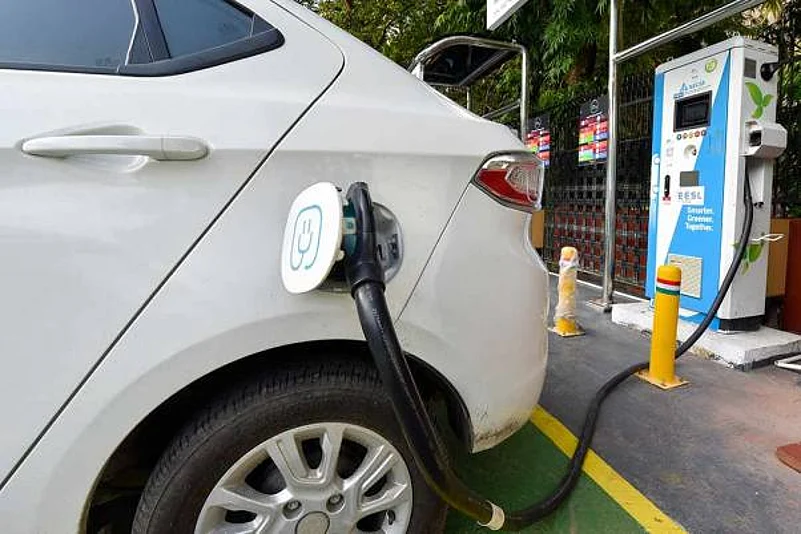Maruti Suzuki India (MSI) seems to be losing its grip in the country's car market as Tata Motors, Hyundai, and others have come up with modern SUVs and Electric Vehicles (EVs) that have captured the attention of Indian people. However, India's largest carmaker is now betting big on hybrid cars to give stiff competition to rivals.
The company has now revealed that instead of EVs, it plans to invest in hybrid cars as what it believes is the future of mobility in a country like India.
Vehicles powered by hybrid technology, natural gas, and biofuels present a better path toward a cleaner future than electric cars considering the nation generates about 75 per cent of its electricity from dirty coal, MSI chairman RC Bhargava said in an interview recently.
While there is a lot of buzz around EVs these days and a lot of carmakers are aggressively launching new cars in the market, MSI has so far maintained its distance from the EV bandwagon. The company believes EVs are not going to be a large part of car sales, irrespective of what other manufacturers are saying or planning.
“The ability to get green transportation is going to take time in India because of the nature of our electricity generation. Talking about electric cars without looking at the greenness of the electricity generated in the country is an inadequate approach to this problem," Bloomberg quoted Bhargava as saying.
“Until the time we have a cleaner grid power, it’s necessary to use all the available technologies like compressed natural gas, ethanol, hybrid and biogas, which will help reduce the carbon footprint and not push any one technology."
Is Maruti Suzuki saying no to EVs?
Recently, Maruti Suzuki and Toyota Kirloskar Motor confirmed plans of jointly working on an SUV model that would be manufactured at the Toyota Kirloskar Motor's facility in Bengaluru.
Besides hybrid cars, the company wants to stick to CNG cars so it doesn't look like the company is in any hurry to jump into the EV market.
Hybrid cars are also a better alternative than EVs given India lacks adequate charging infrastructure, Bhargava recently said. He added that the company will additionally move “aggressively" into cars that run on CNG because they’re cleaner than petrol or diesel models and cheaper than EVs, making them a viable option for those who want to upgrade from a two-wheeler.
Maruti, whose share in the non-SUV segment stands at 67 per cent, has seen sales declining in the last few months. However, the sales are picking pace as the data for the month of May showed signs of recovery.
That said, the company has stayed away from EVs just as rivals such as Tata Motors, MG Motors, and others rush to capture the market. According to reports, Suzuki Motor, the Japanese counterpart, will launch its first compact electric vehicle by 2025 to accelerate the adoption of EVs.
Do Hybrid Cars Make More Sense In India?
Several companies, including Maruti Suzuki India and Toyota have often argued that hybrids make more sense in markets where infrastructure is not ready for electric vehicles (EVs) and that it needs to offer a variety of choices.
Companies often claim that much of the electricity in India and other developing countries is generated by burning coal or other fossil fuel, hence, EVs are more polluting in those markets than hybrids.
Even Honda, which recently launched its hybrid car e:HEV in India, believes hybrid cars make more sense in India and stressed that lowering taxes on hybrid vehicles can lead to faster adoption of EVs in the country.
The total tax incidence on hybrid vehicles in the country is 43 per cent, which is inclusive of GST, while battery electric vehicles attract a tax of about 5 per cent.
This takes the cost of hybrid cars up and makes EVs way cheaper in a price-sensitive market in India. From that standpoint, EVs are a better option but then Hybrid cars are more practical for Indian roads, considering limited support for full-fledged EVs.
Besides, the EV fire incidents were initially limited to e-scooters but recently, a Tata Nexon EV caught fire in Mumbai which may dent the sentiments of prospective buyers towards EVs.
Thus, hybrid vehicles could bridge the trust deficit for those who are still not ready for a pure EV in the country.
Even Honda Cars India's Vice-President (Marketing and Sales) Kunal Behl recently said hybrid vehicles could help in the transition to fully electric vehicles while at the same time helping in cutting down vehicular emissions and fossil fuel consumption.
India wants carmakers to build more electric models but the uptake for such vehicles so far has been slow, and only Tata Motors builds them locally.
Suzuki committed in March to investing $1.4 billion in the country to produce BEVs and batteries, but its local unit, Maruti Suzuki, has said it will not launch a fully electric vehicle before 2025.
Meanwhile, Italian luxury sportscar maker Ferrari recently outlined an electrification strategy that calls for 40 per cent full-electric vehicles and 40 per cent hybrid models by 2030.
Are EVs Cheaper Than Hybrid Cars?
While EVs are currently expensive for mainstream buyers in India, so are hybrids such as Honda e:HEV and Toyota Camry hybrid which costs around Rs 41 lakh.
The challenge faced by the hybrid vehicle market is the high cost as compared to diesel- and petrol-powered vehicles. The price difference is due to parts such as battery and regenerative brake prices. However, there has been a significant decrease in the cost of batteries in the past few years.
By partnering with Suzuki, Toyota may look to bring a low-cost hybrid car in India that may take on pure EVs.
The demand for the hybrid vehicle market is rising due to stringent emission regulation standards and the growing demand for low or zero-emission vehicles.
The overall hybrid vehicle market, by volume, is estimated to be 4,169 thousand units in 2018 and is projected to grow at a CAGR of 8.94 per cent from 2018 to 2025, to reach 7,593 thousand units by 2025.
Though India is the fifth-largest automotive market globally, EV sales in the country are pretty slow despite subsidies and push by the government.
The adoption of EVs saw a steep rise in the last two years, with EV sales rising 155 per cent year-on-year to 4,29,217 units in FY22, as per the Federation of Automobile Dealers Associations’ (FADA). The number of hybrid vehicles sold in FY21 was just 564.
Will Indians find it easy to shift to hybrid or electric cars from conventional petrol, diesel cars?
Honda earlier noted that hybrid technology is currently best suited for Indian conditions as it is not dependent on external charging infrastructure.
High import duties and lack of subsidies have made it tough for the demand of hybrid cars in the country. Hybrid vehicles attract 43 per cent tax which is inclusive of GST, while battery electric vehicles attract a tax of about 5 per cent.
In a price-sensitive market such as India, it gets tough for carmakers to sell these vehicles.
MG Hector and Honda's City eHEV are a few of the hybrid cars in the country starting under Rs 20 lakh. On the other hand, pure EVs in India starts from Rs 12 lakh and there are several options people get to pick from.
Interestingly, according to a global survey conducted by Deloitte, 68 per cent of Indians prefer internal combustion engine-powered vehicles as their next purchase. 24 per cent prefer a hybrid as their next vehicle while only 4 per cent prefer a pure EV.
In December last year, a parliamentary panel recommended treating HEVs at par with EVs for tax incentives in order to achieve India’s targets of carbon emission cuts but nothing much has been done so far.
However, the charging infrastructure for EVs is at a nascent stage and that becomes a deal breaker for many in the country. This is where hybrid cars come into the picture but not every common man can purchase a hybrid car due to its cost. This leaves many with the conventional petrol and diesel cars that fit in their budget and have been a reliable option.
































